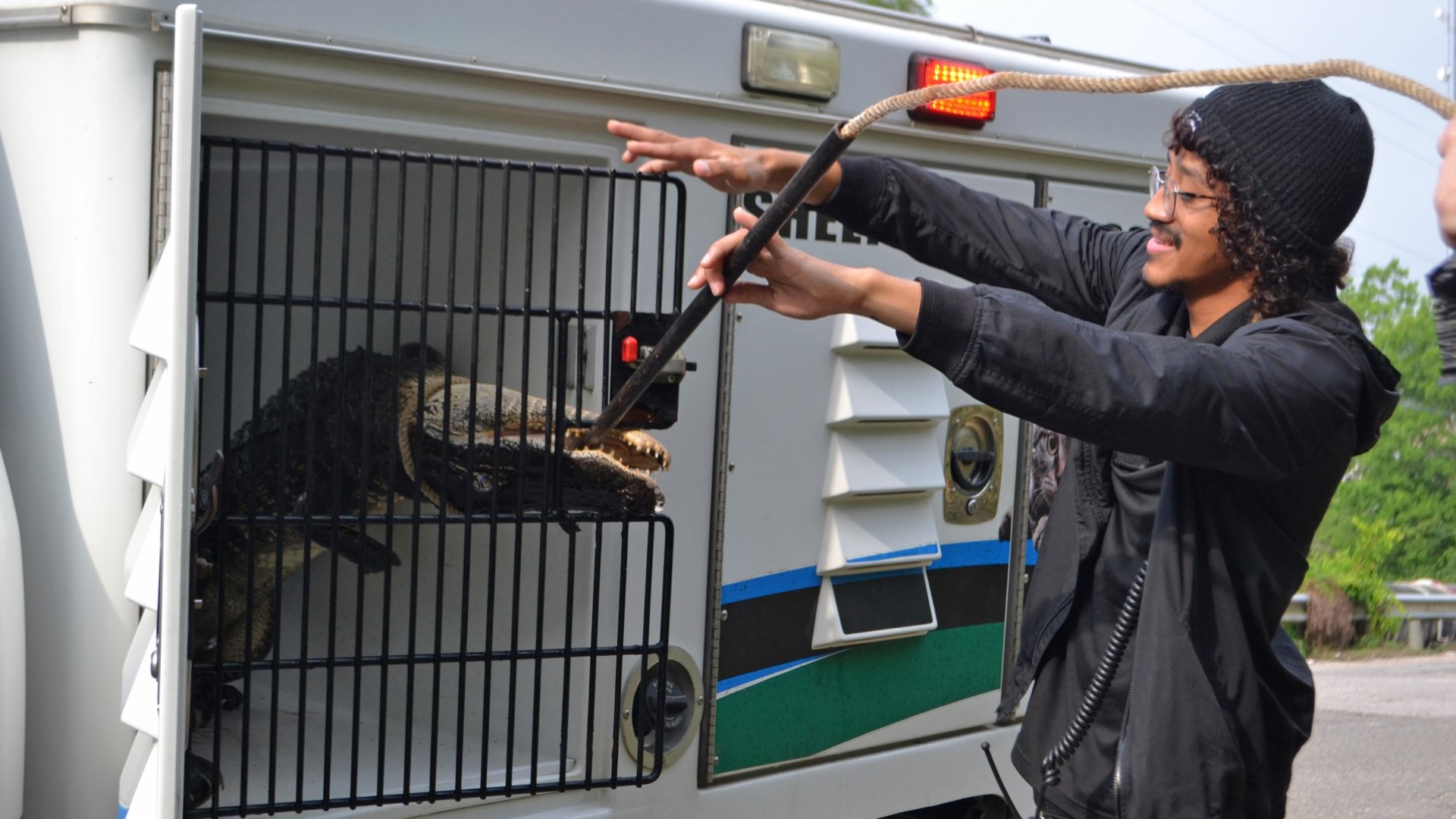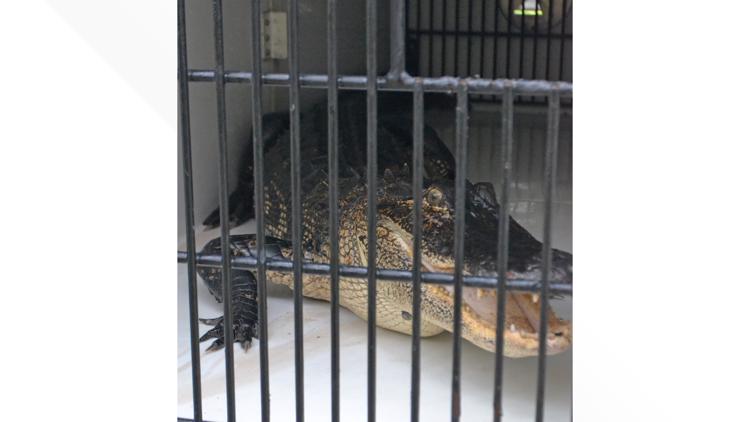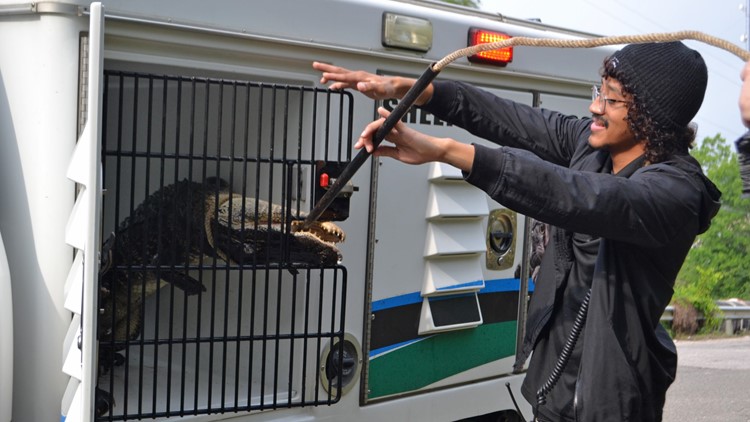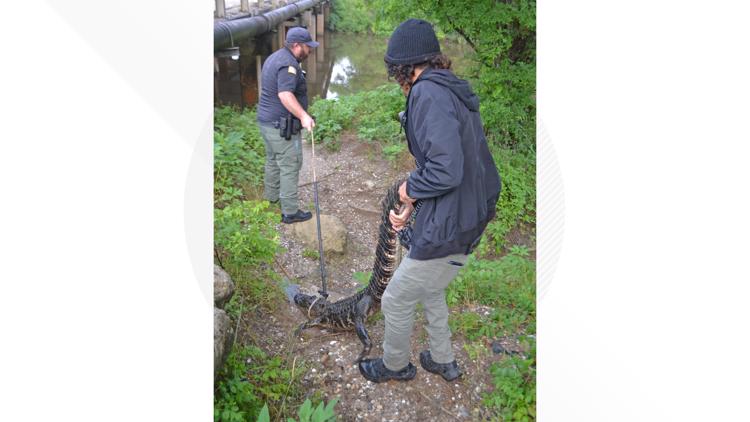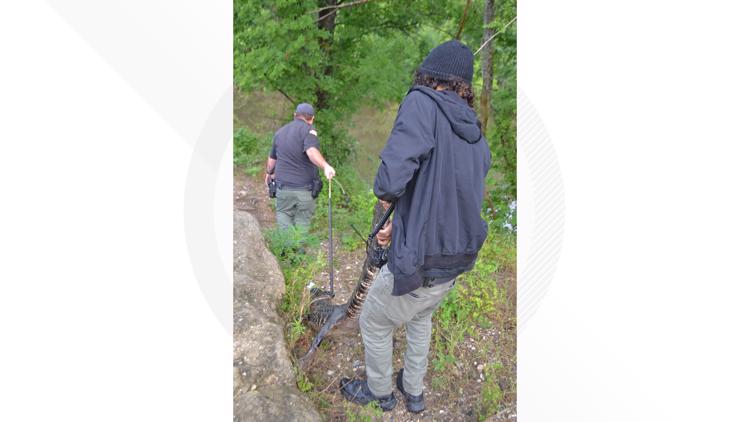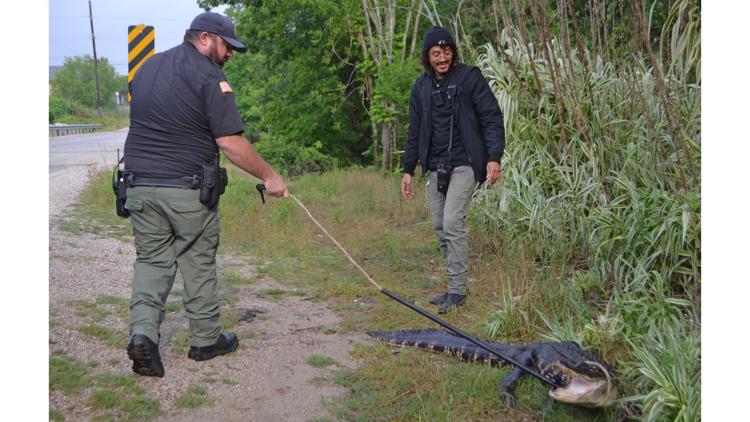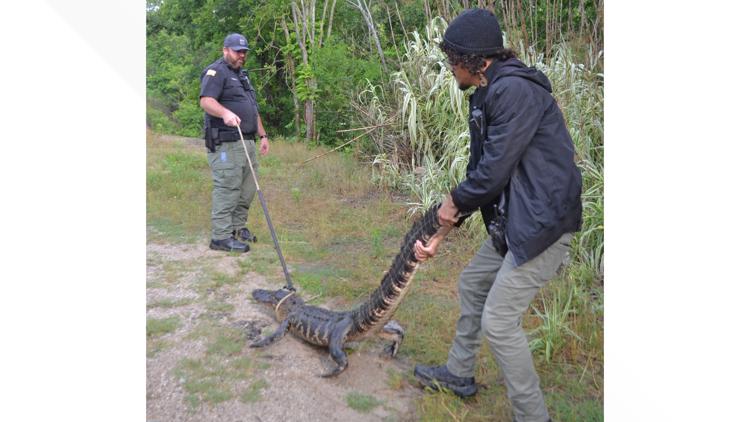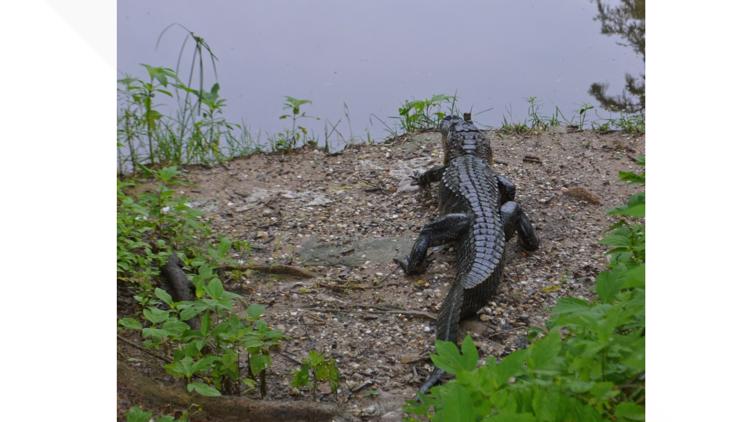BEAUMONT, Texas — Beaumont Animal Care's newest officer got what he described as a pretty exciting call this morning after a gator was spotted on a downtown Beaumont street.
Taijh Thibodeaux, 24, of Beaumont, has been on the job since October 2022 and in that time he's picked up plenty of dogs, cats and even snakes, owls, chickens and peacocks. Yes, peacocks. But this was his first aligator.
On a cloudy Tuesday morning following a stormy Monday he got several feet more then he anticipated when he was sent to pick up a "baby" alligator.
He was expecting something little, but not the 6-foot-long young gator he found trying to squeeze into a storm drain on Magazine St just off North Main St in downtown.
"They told me it was a baby gator, but I didn't expect it to be the size of me," he told 12News by phone.
The gator couldn't even get his head into the storm drain opening on the curb he said.
Thibodeaux headed toward the gator with a large net but ended up just grabbing it by the tail and dragging it to the truck.
A local band, Ole Lonesome, posted video of the scene on their page, calling the gator a "boo boo dog fresh out the Boogie Swamp."
Before Tuesday morning Thibodeaux, who was born and raised in Beaumont, had only been close to an alligator at Gator Country. He'd never touched one before.
In spite of this, he managed to wrangle the reptile into the truck on his own and secure it in a cage.
Once he got back to the BCA shelter a few blocks away he enlisted the help of fellow BCA officer Dustin Carraway to release the gator around the corner from the shelter.
Gator caught trying to squeeze into downtown Beaumont storm drain
They let him go into an offshoot of the Neches River off Marina Dr.
Officers with BCA don't handle alligators very often according to Viviana Lopez, adoption and marketing coordinator at BCA.
They may only get a couple gator calls a year she said.
Usually if people leave them alone they go away but because this one was on a road they relocated it according to Lopez.
Thibodueax loves his job at BCA and says it's the most fun he's had working since being in the U.S. Army.
Here's some more about alligators in from the Texas Parks & Wildlife Department
IF YOU SEE AN ALLIGATOR...
The following is from the TPWD website.
If the alligator is not approaching people or otherwise posing an obvious threat, wait a few days if possible - even up to a week - before contacting TPWD. In spring and summer, alligators are moving to breed and find new habitat. Most of the alligators moving around are smaller ones that have been pushed out of their normal habitat by larger alligators. Usually, these smaller alligators will move further on in a week or two.
If you hear an alligator hiss, it's a warning that you are too close.
Alligators have a natural fear of humans, and usually begin a quick retreat when approached by people. If you have a close encounter with an alligator a few yards away, back away slowly. It is extremely rare for wild alligators to chase people, but they can run up to 35 miles per hour for short distances on land. Never make the mistake of thinking that an alligator is slow and lethargic. Alligators are extremely quick and agile and will defend themselves when cornered. A female protecting her nest might charge a person who gets close to the nest, but she would quickly return to the nest after the intruder left.
It is not uncommon for alligators to bask along the banks of a pond or stream for extended periods of time. These alligators are usually warming their bodies; they are not actively hunting. Often times a basking alligator may be seen with its mouth open; this is a way to cool its body temperature down, since alligators do not pant or sweat. An approaching human should cause these alligators to retreat into the water. (In some cases, the alligator may be protecting a nest - see below.) However, an alligator may be considered a nuisance if it leaves the banks of the water body to spend time near homes, livestock pens, or other structures.
If you walk near the water and an alligator comes straight toward you, especially if it comes out of the water, it is definitely a nuisance alligator that needs to be reported to TPWD. In many cases, these are alligators that have been fed by people or have been allowed to get human food.
If you see an alligator while walking a pet make sure that your pet is on a leash and under your control. Your pet will naturally be curious, and the alligator may see an easy food source. Alligators have a keen sense of smell. In areas near alligator sightings it is wise to keep pets inside a fenced area or in the house for a few days, during which the alligator will often move on.
If you see an alligator in the roadway, DO NOT attempt to move it! Notify local authorities so the alligator can be handled safely.
If you see a large alligator in your favorite swimming hole or pond, do not swim with it. Although alligator attacks in Texas are rare, it can happen. The "attack" reports in Texas are usually more accurately described as "encounters." As with all outdoor activities, realize that wildlife encounters are a possibility.
It is not uncommon for alligators to pursue top-water fishing lures, and this activity does not constitute a threat to humans. As with fish, alligators are attracted to these lures because they mimic natural food. Most alligators can be easily scared away from boats or fishing lures. However, alligators that repeatedly follow boats, canoes, or other watercraft, and/or maintain a close distance without submersing may be considered nuisance alligators.
If you see a nuisance alligator, consider why it is there. Did someone clean fish and throw the heads into a pond or river? If so, they created a potential alligator problem and could be breaking state regulations. Since October 1, 2003, it has been a Class C misdemeanor punishable by a fine of up to $500 for anyone caught feeding an alligator.
The American alligator was once very common in rivers, creeks, and backwater sloughs of East and South Texas. Unregulated market hunting and habitat alteration resulted in near extirpation of the species in Texas by the 1950's. Legal protection, enhanced habitat conditions, and new water impoundment projects have resulted in a rapid repopulation of Texas by alligators during the past 20 years. To complicate matters, an ever-expanding human population continues to encroach upon the alligator's domain. These factors contribute to increased encounters between alligators and people.
Most Texans in "gator country" will live in close proximity to these native reptiles with no confrontations. However, there are occasions when certain alligators become "a nuisance" and must be handled by the proper authorities. TPWD received more than 400 nuisance alligator calls in Southeast Texas during 2003. (A substantial number of these were not true problem gators, and the sheer volume of these reports is taxing available manpower and resources needed to handle the real problems.) More than 100 alligators were relocated, mostly from subdivisions adjacent to natural habitat. A similar number had to be killed in similar situations. In these incidents alligators had lost their fear of humans and exhibited aggressive behavior. Relocation is not always a viable option, as by nature these animals are territorial. Relocating problem animals to other areas often creates greater problems. What is needed is a better-educated populace more able to recognize the few nuisance alligators and to coexist safely with the majority of alligators that are not nuisances.
The current legal definition of a nuisance gator is "an alligator that is depredating [killing livestock or pets] or a threat to human health or safety" under definitions laid out in the Texas Administrative Code (Title 31, Part 2, Chapter 65, Section 65.352). The following information should help you determine if the observed alligator may pose a threat to you or your property. If, after reading the following, you determine that an alligator is a "nuisance," please contact the Texas Parks and Wildlife Department law enforcement communications center in Austin at (512) 389-4848.
Also on 12NewsNow.com…

